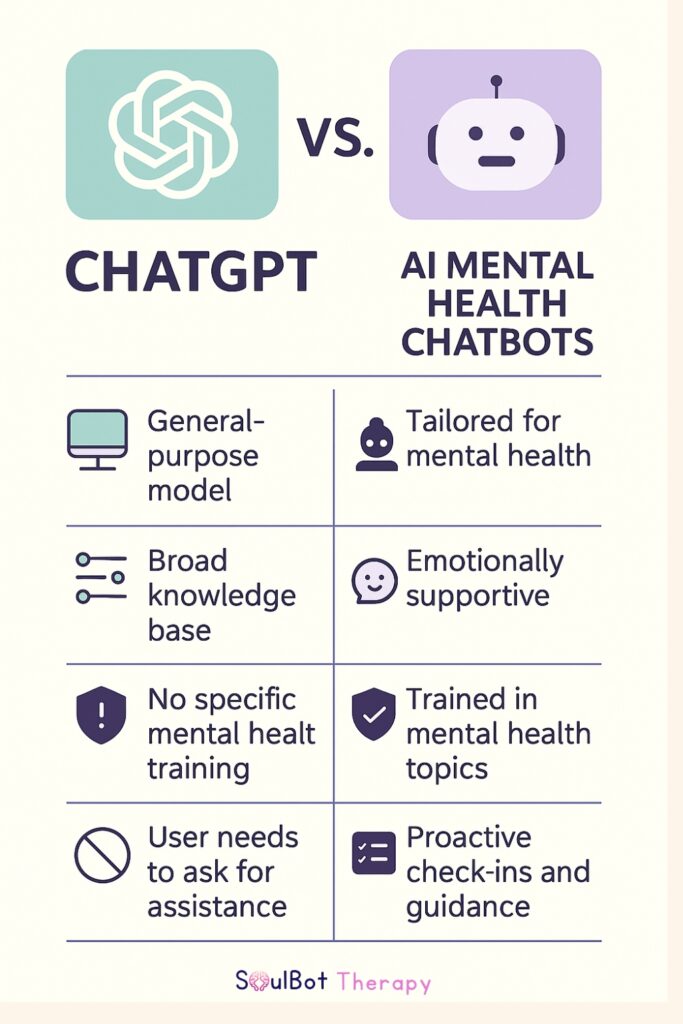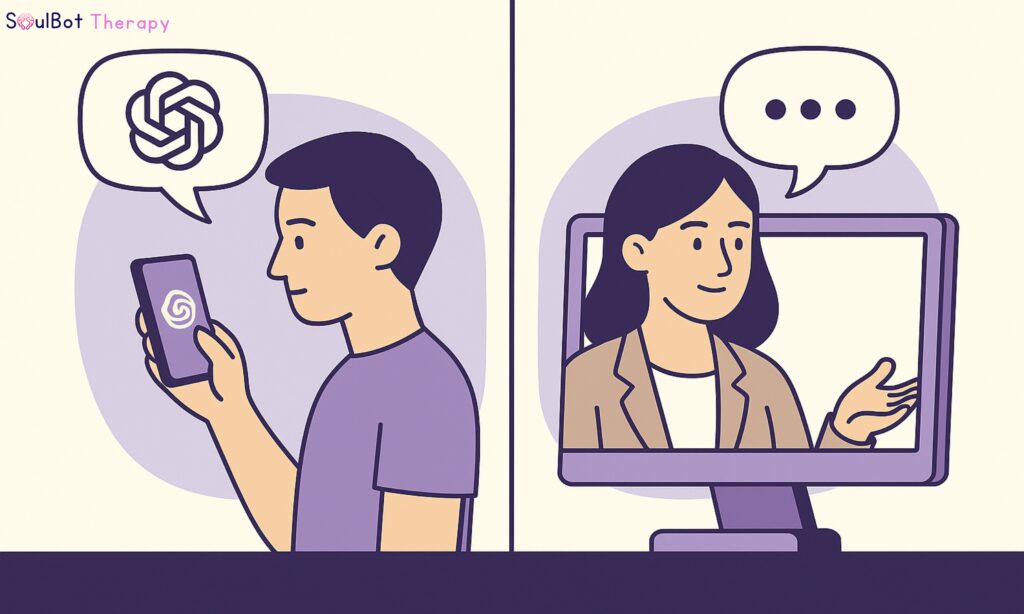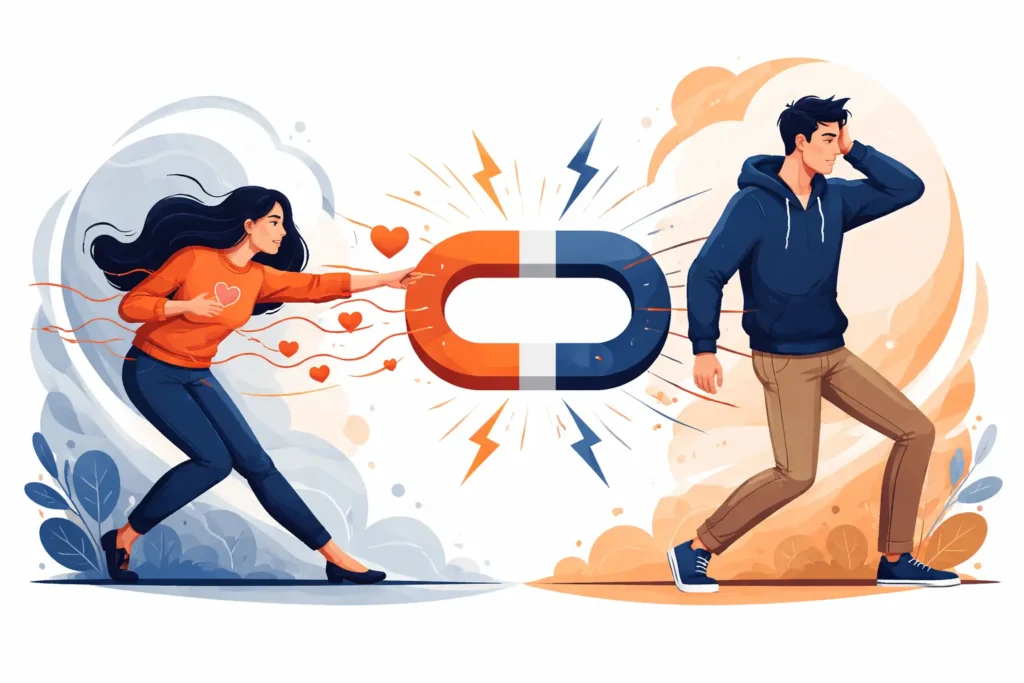Not all chatbots are designed to support your emotions. Some just talk. Others actually help you heal.
This AI mental health chatbots comparison will show you exactly why choosing the right emotional support tool matters and could save you from real harm.
💭 Why This AI Mental Health Chatbots Comparison Actually Matters?
Let’s not sugarcoat it.
As mental health conversations go digital, millions are searching for AI therapy tools, emotional AI chatbots, and AI mental health support. The numbers are staggering: over 50 million people use AI for emotional support monthly, yet only 1 FDA-approved AI mental health app exists.
But here’s the brutal truth about ChatGPT mental health usage: ChatGPT and purpose-built AI mental health assistants like SoulBot aren’t even in the same category. One’s a general AI trained on everything. The other is trained specifically for your emotional well-being.
Understanding this AI mental health chatbots comparison can save you from misinformation and, in some cases, emotional harm.
🧠 ChatGPT: Smart, But Not Your Therapist
Let me be crystal clear about this.
ChatGPT is a language model, not a licensed therapist. It can generate self-help advice, explain mental health concepts, and even talk like a friend. But when it comes to real AI mental health support? That’s where it stops.
❌ What ChatGPT Can’t Do:
- Track your emotional progress over time—it forgets you exist after each chat
- Recognize trauma triggers or crisis moments—no specialized training
- Provide therapy-based reflection tools—it’s not built as an emotional AI chatbot
- Ensure mental health data privacy—general privacy policies, not therapy-grade
- Offer evidence-based therapeutic frameworks—lacks ethical AI therapy design
Reality Check: The American Psychological Association recently warned that "unregulated mental health chatbots can mislead users and pose serious risks, particularly to vulnerable individuals."
Using ChatGPT for emotional healing is like Googling “how to fix a broken heart” and expecting closure. It might give you words, but it won’t walk the journey with you.
❤️ SoulBot: Your Purpose-Built AI Mental Health Assistant
Here’s where the AI mental health chatbots comparison gets interesting.
SoulBot isn’t just another chatbot trying to do therapy. It’s designed with one laser-focused goal: AI mental health support that feels human, safe, and continuous.
Built specifically as an AI mental health assistant, SoulBot is trauma-aware, privacy-safe, and identity-affirming. It’s what ethical AI therapy actually looks like.
✅ What Makes SoulBot Different from Other AI Therapy Tools:
- Tracks your moods, patterns, and emotional history—absolute continuity, not reset conversations
- Offers journaling prompts, reflection tools & guided exercises—actual therapeutic structure
- Designed with ethical AI therapy principles—built BY mental health experts, not just programmers
- Safe space for exploring identity, emotions, and relationships—especially crucial for LGBTQ+ individuals
- Available 24/7—even when human therapists aren’t accessible
- Crisis-aware responses—know when you need more than just chat
SoulBot isn’t just talking at you—it’s walking with you. That’s the difference between a general chatbot and a true emotional AI chatbot.
⚖️ The Ultimate AI Mental Health Chatbots Comparison
Let’s break down this AI mental health chatbot comparison with brutal honesty:
| Feature | ChatGPT | SoulBot (AI Mental Health Assistant) |
| Purpose | General-purpose chatbot | Built for mental wellness & identity support |
| Emotional Memory | ❌ None—resets every chat | ✅ Tracks mood & sessions over time |
| Therapeutic Design | ❌ No specialized training | ✅ Yes (trauma-informed & evidence-based) |
| LGBTQ+ Inclusion | Generic, potentially harmful responses | Affirming, inclusive, identity-safe space |
| Journaling & Reflection | Basic suggestions only | Guided self-reflection tools & prompts |
| Data Privacy | General consumer policy | Mental health-specific safeguards |
| Crisis Recognition | ❌ Not trained for emergencies | ✅ Trauma-aware interaction protocols |
| 24/7 Support Quality | Available but generic responses | Emotionally intelligent, contextual support |
| Relationship Tools | Surface-level advice | Deep relationship dynamics support |
The Verdict: When it comes to AI therapy tools, purpose beats general intelligence every single time.

🛡️ What Makes Safe AI Mental Health Support?
Not all AI therapy tools are created equal. Here’s what separates the good from the potentially dangerous:
1. Transparency & Honesty
- Clear boundaries (this is NOT a human therapist)
- Honest about limitations and capabilities
- No false promises about “curing” mental health conditions
2. Trauma-Informed Response Training
- No toxic positivity validates your difficult emotions
- Sensitive to triggers and mental health language
- Knows when to escalate to human professionals
3. Ethical AI Therapy Design
- Built with input from actual mental health professionals
- Follows privacy-first and consent-based frameworks
- Designed for healing, not just engagement metrics
4. Mental Health Data Protection
- Conversations are secure and confidential
- No selling or misuse of your emotional data
- HIPAA-level privacy standards
The Reality: Most emotional AI chatbots don’t meet these standards. SoulBot does.
📌 When Should You Use Which AI Mental Health Support?
This AI mental health chatbots comparison boils down to one question: What do you actually need?
💬 Use ChatGPT When You Need:
- Basic information about psychology terms or concepts
- Help brainstorming wellness routines or self-care ideas
- General productivity advice that touches on mental health
- Quick explanations of therapeutic approaches
💚 Use SoulBot When You Need:
- Consistent emotional support through tough times
- Identity exploration—especially gender, sexuality, or relationship questions
- Daily mental health tools—anxiety management, mood tracking, reflection
- Healing support—processing heartbreak, trauma, or significant life changes
- A judgment-free space to examine your thoughts and feelings
- Guided therapeutic exercises that actually help you grow
Bottom Line: ChatGPT helps with words and information. SoulBot helps with feelings and healing.
🤖 The Future of AI vs Human Therapists
Here’s the truth about the AI vs human therapists debate:
AI will never replace human therapy. But AI mental health support can bridge the gap for the 26% of Americans who cite cost as their most significant barrier to mental health care.
The Sweet Spot: Using AI therapy tools like SoulBot as:
- Support between therapy sessions
- Daily emotional check-ins and mood tracking
- Identity exploration in a safe, private space
- Crisis prevention through consistent emotional support
- Affordable mental health maintenance
What AI Can’t Do: Diagnose mental health conditions, provide crisis intervention, or replace the human connection that therapy offers.
🎯 The Bottom Line: Choose Your AI Mental Health Support Carefully
AI can absolutely support mental wellness, but it has to be the right kind of AI, designed with the right intentions.
This AI mental health chatbots comparison comes down to one simple truth: ChatGPT helps with words. SoulBot helps with feelings.
If you want a companion that actually listens, adapts, learns your patterns, and supports your mental health journey (not just answers questions), SoulBot is built specifically for you.
🌟 Ready for AI Mental Health Support That Actually Gets You?
Try SoulBot – The AI Mental Health Assistant Designed for Real Emotional Growth








